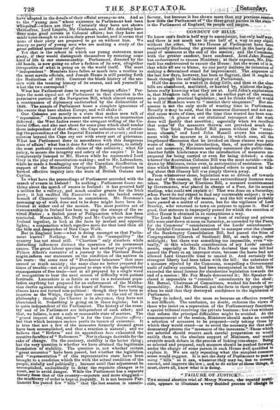-, .- - • CONDUCT OF BILL .
To know one's fiultis half viity to amendment, butonly halfway, 'and there is' not much use in.one half of a way to any object Without the _other. The two Houses of Paelianient hag,. been reciprocally :disclosing the grossest misconduct:Au the hesty.die. posal of measures at the end of the session ; 4110, the Commons with the greater candour, lave confessed. Lard Johnjleseeti raeli has endeavoured to excuse the House : but the worst of it is,
ax•Pellaaddr.. Dis- hes endeavoured to eicuse Ministers ; at their that while ail are to blame, no one party declares its intention of making a determined stand for improvement. ,The exposure of the last feWtlays however,' has been so flagrant,44, it ought to break through the self-indulgence of P,arliatnent,.
Half the session is wasted in doinglittle, antl tilteni at the close bills are abandoned, mutilated, or hurried by, vothont plAelegis- lators really knowing what they are at. Lord John's explanation is, that MeiUbers talk so pinch in the. earlier part of the session as to preclude practical legislation ; and he thinks that all would be well if Members were to "restrict their eloquence." But elo- quence in not the only mode of wasting time in Parliament. Broadly itinay be said, that the measures discussed and not car- ried cause Waste of time, and the timethus wasted has been con- siderable. -"Aglance at our statistical retrospect of: the work done will Justify that assertion ; especially when we recollect that some4f the measures' thrown- out provoked much de- bate. The:Irish Poor-Relief . Bill passes without the "maxi- mum clauses," and Lord John Russell avows his content- ment with the measure as it stands ; in which case, all the lengthenedidiscussion that he invoked on those clauses was pure waste of tithe. By the introduction, then, of matter disputable and not neassary, Ministers uselessly consumed the public time. Another futile hinderance was the, introduction of measures un- prepared foCheing carried or even for being debated ; a class whereof the'3ustralian Colonies Bill was the most notablewitli- drawn by Ministers, twice over, in anticipation of resistance. The time whichiffinisters spent and induced others to spend in talk- ing about thin illusory bill was simply thrown away.
From whatsoever cause, legislation was so driven off towards
the end of the session, that the most extraordinary licences were taken. The 'Bribery at 'Elections Bill, a measure countenanced by Goverthitent, was'.placed in charge of a Peer, for its second 'reading, who could MK etplain it! That was done on a Saturday, ,,then Peenrdo hoe_etpect to find any 'contestable subject ; it was on the last Saturday of the session; and the bill would probably . have passed als a matter of course, but for the vigilance of Lord Stanley, wile' returned to town on purpose to oppose it Bad or good, that measure is improperly passed for which the sanction of either House Is obtained in so surreptitious a way.
The Lords had their revenge: a host of railway and private
bills were sentidown at noon on Saturday, as amended by the Peers, for the Commons' " consideration of the Lords' amendments." The faithful' Commons had consented to scamper over the clauses of the Bankrbptcy Consolidation Bali had passed the Sites of Congregations (Church of Scotland) Bill, at each stage, after midnight; Ant there was something too impossible, even "vir- tually," in' this wholesale consideration of my Lords' amend- ments, especially as Mr. Fox Maule declared that one bill had
in . passed the Peers n an improper state, because the haste had not
allowed Lord Granville time to amend it. And certainly the strangest liberty had been taken with the bill : the substance of a measure rejected by the Commons, compelling a Government audit of railway accounts,' had been incorporated in the bill. This exceeded the usual licence for clandestine legislation towards the end of a session : Mr. Fox Maule denounced it; Mr.-Speaker de- clared it impossible to "consider " amendments by the shoal;
Mr. Bernal, Chairman of Committees, washed his hands of re- sponsibility. And Mr. Disraeli put the facts in their proper light when he said that they destroyed confluence in the legislation of Parliament.
They do indeed, and the more so because an effective remedy
is not difficult. The confusion, no doubt, enforces the views of those who insist on a separation., of the Parliamentary functions, a special tribunal receiving the private business.: but even without that reform the principal difficulties might be avoided. At the commencement of the session, Ministers should make- so careful a selection of measures to be proposed—only taking those by which they would stand—as to-avoid the.neeessityfor that self- dainnatorf process the "massacre of the innocents.' eThose which are selected should receive such careful preparation as would entitle them to. the absolute support of Ministers, and would override much debate in the process of licking iritoshape. Being so selected and prepared, each measure should be.puehed forward, under the charge of some person in each Housewell qualified to explain it. We are only repeating what theisimplest common 'sense would suggest. It is not the duty of Parliament to pass as 'nand " bills" as it Can,. whatever they may..heil.indrte correct, 'amend, and improve the law ; and, to. do eithernahese things, it must, above all, know what it is doing. . (..,0 IT :.-- _


























 Previous page
Previous page